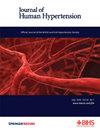持续气道正压对顽固性高血压合并阻塞性睡眠呼吸暂停患者血压的长期影响。
IF 3.4
4区 医学
Q2 PERIPHERAL VASCULAR DISEASE
引用次数: 0
摘要
持续气道正压通气(CPAP)是阻塞性睡眠呼吸暂停(OSA)的金标准治疗方法。其对顽固性高血压(RHT)的长期影响尚未完全确定。我们进行了一项前瞻性干预研究,以评估长期CPAP治疗对RHT和中重度OSA患者办公室和动态血压(BP)的影响。使用CPAP至少12个月的患者被纳入CPAP组,并与那些尽管有临床适应症而拒绝使用CPAP的患者(对照组)进行比较。所有参与者在基线和研究结束时都进行了24小时动态血压监测(ABPM)。使用一般线性模型进行组间血压变化比较,包括对最佳CPAP依从性(至少4小时/夜)和难治性高血压患者进行两项按方案分析。共纳入124例患者(CPAP组65例,对照组59例),平均年龄60.7±7.8岁。意向治疗分析发现两组之间总体血压变化无显著差异。按方案分析(50名最佳依从性CPAP使用者和28名难治性高血压患者)显示夜间收缩压(-8.1 mmHg (95% CI分别为-14.7至-1.5)和-25.6 mmHg (95% CI分别为-40.1至-10.5)和夜间舒张压(-5.3 mmHg (95% CI分别为-9.6至-1.1)和-13.9 mmHg (95% CI分别为-22.5至-5.3)显著降低。这些发现表明,虽然CPAP有利于坚持患者和难治性高血压患者,但其对顽固性高血压的整体长期影响有待进一步研究。本文章由计算机程序翻译,如有差异,请以英文原文为准。

Long-term effect of continuous positive airway pressure on blood pressure in patients with resistant hypertension and obstructive sleep apnea
Continuous Positive Airway Pressure (CPAP) is the gold standard treatment for Obstructive Sleep Apnea (OSA). Its long-term effects on Resistant Hypertension (RHT) have not yet been fully established. We conducted a prospective intervention study to evaluate the impact of long-term CPAP therapy on office and ambulatory blood pressure (BP) in patients with RHT and moderate to severe OSA. Patients who used CPAP for a minimum of 12 months were included in the CPAP group and compared with those who declined to use CPAP despite clinical indications (control group). All participants underwent 24-h ambulatory blood pressure monitoring (ABPM) at baseline and at the end of the study. Intergroup comparisons of BP changes were performed using a general linear model, including two per-protocol analyses for patients with optimal CPAP adherence (at least 4 h/night) and those with refractory hypertension. A total of 124 individuals were included (65 in the CPAP group and 59 controls), with a mean age of 60.7 ± 7.8 years. The intention-to-treat analysis found no significant differences in overall BP changes between groups. The per-protocol analyses (50 CPAP users with optimal adherence and 28 with refractory hypertension) showed significant reductions in nighttime systolic BP (−8.1 mmHg (95% CI −14.7 to −1.5) and −25.6 mmHg (95% CI −40.1 – −10.5), respectively) and in nighttime diastolic BP (−5.3 mmHg (95% CI −9.6 to −1.1) and −13.9 mmHg (95% CI −22.5 – −5.3), respectively). These findings suggest that while CPAP benefits adherent patients and refractory hypertensives, its overall long-term effects on resistant hypertension require further investigation.
求助全文
通过发布文献求助,成功后即可免费获取论文全文。
去求助
来源期刊

Journal of Human Hypertension
医学-外周血管病
CiteScore
5.20
自引率
3.70%
发文量
126
审稿时长
6-12 weeks
期刊介绍:
Journal of Human Hypertension is published monthly and is of interest to health care professionals who deal with hypertension (specialists, internists, primary care physicians) and public health workers. We believe that our patients benefit from robust scientific data that are based on well conducted clinical trials. We also believe that basic sciences are the foundations on which we build our knowledge of clinical conditions and their management. Towards this end, although we are primarily a clinical based journal, we also welcome suitable basic sciences studies that promote our understanding of human hypertension.
The journal aims to perform the dual role of increasing knowledge in the field of high blood pressure as well as improving the standard of care of patients. The editors will consider for publication all suitable papers dealing directly or indirectly with clinical aspects of hypertension, including but not limited to epidemiology, pathophysiology, therapeutics and basic sciences involving human subjects or tissues. We also consider papers from all specialties such as ophthalmology, cardiology, nephrology, obstetrics and stroke medicine that deal with the various aspects of hypertension and its complications.
 求助内容:
求助内容: 应助结果提醒方式:
应助结果提醒方式:


